“Winning a sprint combination is about skating four distances and you can’t afford any mistakes,” agreed the Dutch gold and silver ISU European Sprint Championship medalists on Saturday, for very different reasons.
Merijn Scheperkamp (NED) said it with a big smile after he bagged his career first European Sprint title in Hamar; Hein Otterspeer (NED) said it in agony after blowing his title chances with a near-crash in the second 500m on Saturday.
Otterspeer managed to hang on to silver with a strong response in the 1000m, while Marten Liiv won Estonia’s first ever European Championships medal with third place.
In the Allround Championships, Patrick Roest (NED) took the lead after two distances, but Sander Eitrem (NOR) kept the Dutchman in sight, setting up a tight battle for Sunday.
Otterspeer 'devastated' by 500m slip
“I’ll have to make the difference in the 500m,” Scheperkamp said ahead of the battle with Hein Otterspeer on the second day of the men’s sprint tournament. After the first day, 22-year-old Dutchman Scheperkamp was second in the overall ranking, trailing his 34-year-old compatriot by 0.140 points.
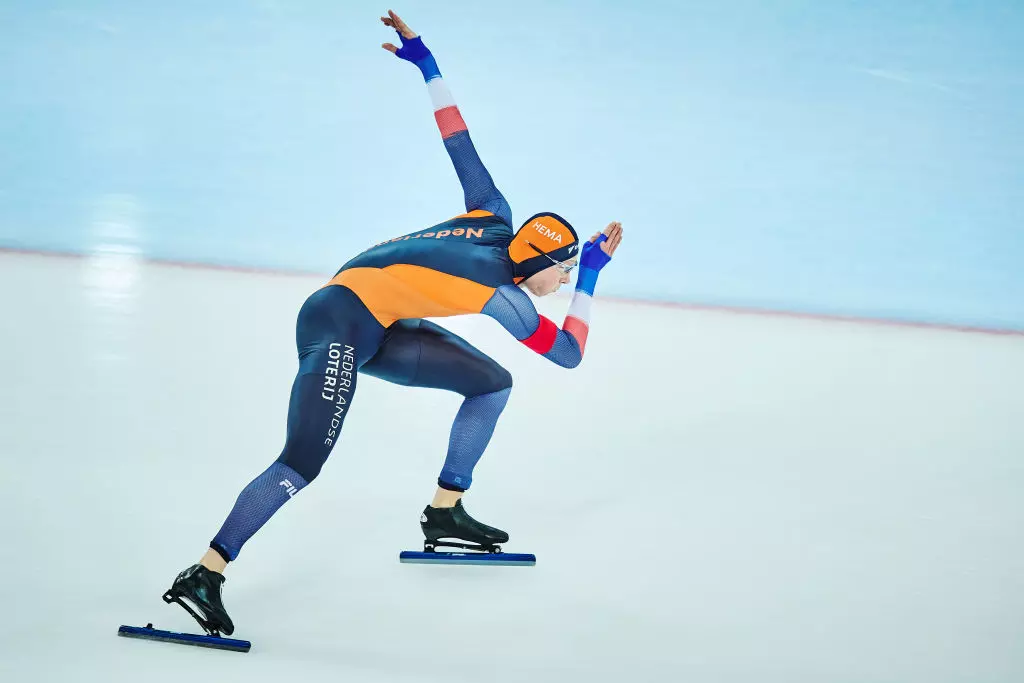
Merijn Scheperkamp (NED) took advantage of rival Hein Otterspeer's late slip to overhaul him in the Sprint rankings. @ISU
The two faced each other in the final pair of the second 500m on Saturday and Scheperkamp made good on his promise. Hammering out the fastest opener of the field in 9.82, he put the pressure on Otterspeer, who had started from the inner lane.
At the backstretch Scheperkamp chased down his rival, and when he went past him in the final corner, Otterspeer hit trouble. The leader in the ranking lost grip and with it precious tenths of seconds, while Scheperkamp powered through to win the distance in 35.13.
Barely staying on his blades in the corner, Otterspeer wasn’t able to recover in the final straight and crossed the line in 35.69s to come in eleventh and drop to fourth in the ranking.
“A tough day at the office,” Otterspeer lamented: he had been in the perfect position to seize his career first international title before his 500m mishap.
“I feel devastated. If I had done what I’m capable of, it would have been enough for the title, but you have to show it on the scoreboard. I let the gold medal slip away.”
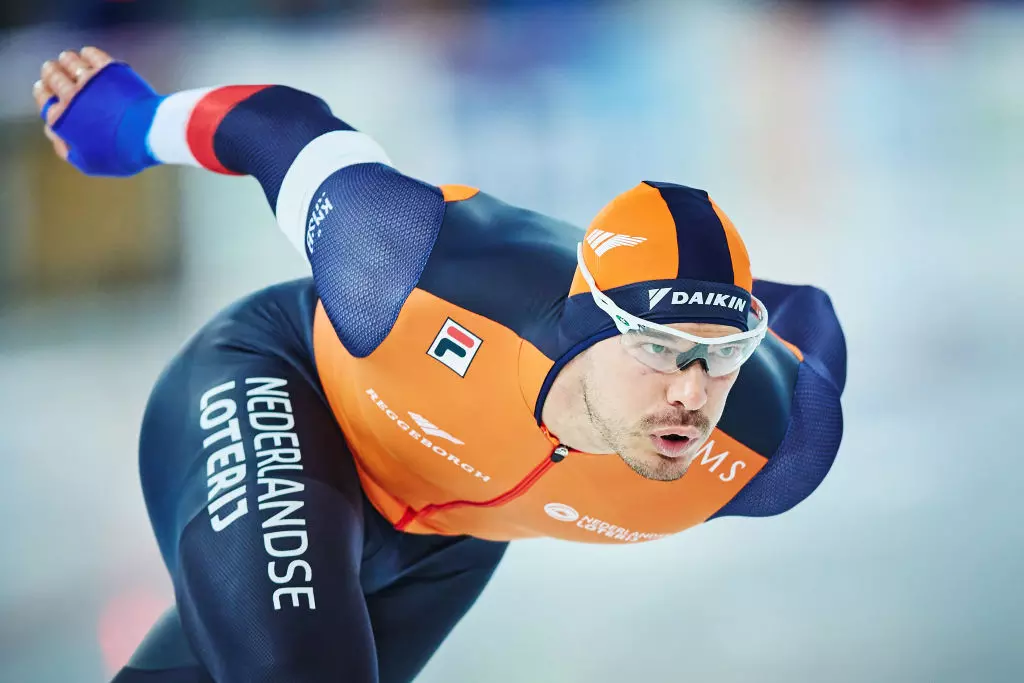
Hein Otterspeer (NED) admitted to feeling 'devastated' after a loss of grip on the final corner of the 500m cost him valuable time. @ISU
Otterspeer had also had a mis-stroke in Friday’s 500m, but that hadn’t cost him too much time. This time it was different.
“It happened at the same spot as yesterday,” he said. “That’s where the ice-cleaning machines enter the rink and the surface is not perfectly flat. Coming through the corner at 60km/h, I lost grip and that’s trouble.
“[Until that moment] I had a good race. I felt as if I could control Merijn [who had the last inner corner] well, but then I lost balance. You just have to be stable, that’s the secret of a championships.”
Liiv finished in 35.23s to come second in Saturday’s 500m, climbing from third to second in the overall ranking in the process. Heading into the final 1000m, Liiv had to make up 0.48s to beat Scheperkamp to the title.
Kai Verbij (NED) also took advantage of Otterspeer’s misfortune, finishing third in the 500m in 35.28s and climbing to third place overall, 0.73s behind leader Scheperkamp. Otterspeer was 0.82s behind Scheperkamp after three distances.
Scheperkamp defies pressure to take title
After his 500m disappointment, Otterspeer managed to regroup and skated the final 1000m in a time of 1 minute and 8.66s. He was back on top of the ranking with the fastest 1000m time, when Scheperkamp and Liiv took the ice to conclude the competition.
Scheperkamp needed to finish inside 1:09.48 to overhaul Otterspeer. He stopped the clock with almost half a second to spare, in a time of 1:09.00.
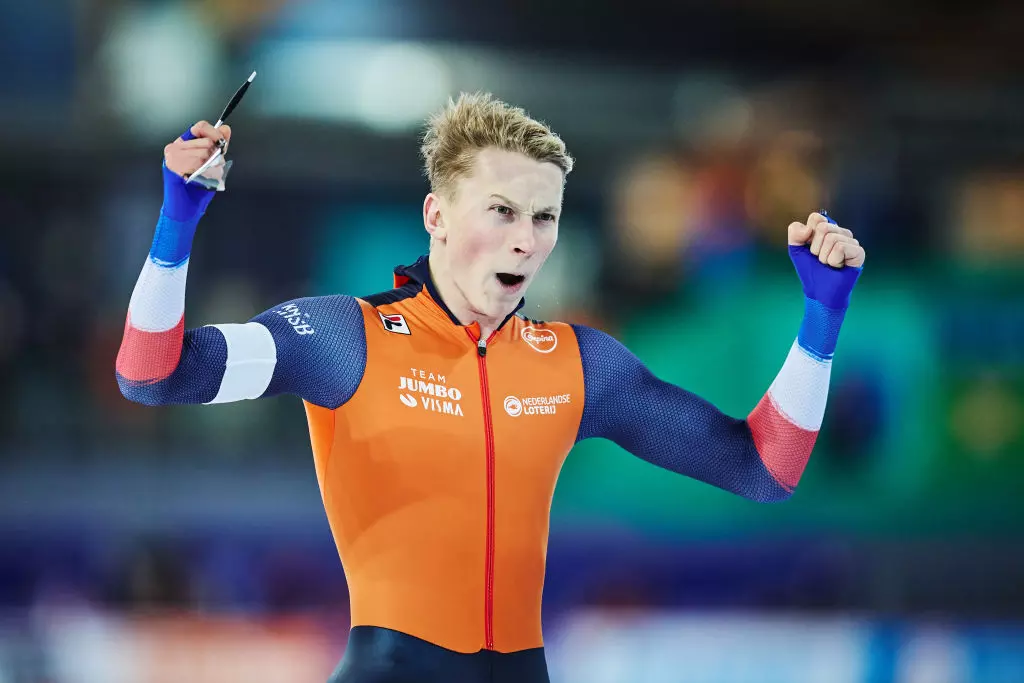
Scheperkamp (NED) skated a solid second 1000m to stay inside Otterspeer's overall time and win European Sprint gold. @ISU
“I really felt the pressure”, Scheperkamp said. “Eight tenths of a second may sound like a big gap, it actually isn’t that much. If you make just a tiny mistake you may lose half a second and mistakes are easily made in sprinting.
“I’m so happy that I pulled it off. I’ve already said it before the tournament: you have to be solid in four distances and that’s what I did. I’m second, second, first and second; then you deserve to win.”
Liiv had a similar streak to end up in third place overall. The 26-year-old Estonian finished third three times and second once to keep 2019 champion Kai Verbij (NED) off the podium and to become the first Estonian ever to win an European Championships medal in speed skating.
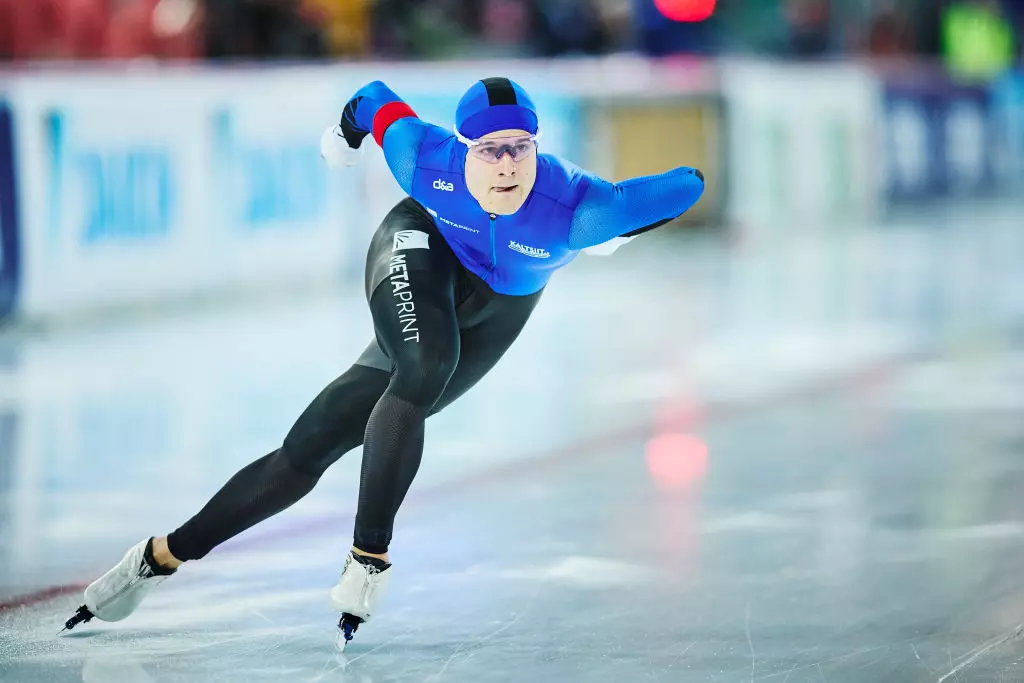
Marten Liiv (EST) made history at Hamar's Vikingskipet by becoming the first Estonian skater to win a European Championship medal. @ISU
“It means a lot,” he said. “Actually, the goal was top five, but after the first day was so good, I thought the medal was possible.
“It brought extra pressure, but I think that was helping me, because when you're so high in the ranking on the first day, you just need to push more to give everything.
“[My tournament] was good, podium in every distance. It felt good and it was stable, that was the key why I ended up third.”
Roest on top in tight Allround battle
Patrick Roest began the Allround championships with a spectacular time of 36.45s in the 500m, taking an early advantage over Norwegian youngsters Peder Kongshaug (36.55) and Sander Eitrem (36.94).
When he posted a time of 6 minutes and 13.31s in the 5000m, Roest thought he was well on course to win the second distance too, but then Eitrem took the ice in the final pair.
Eitrem posted similar lap times to Roest in the first part of his race, but managed to accelerate in the second part.
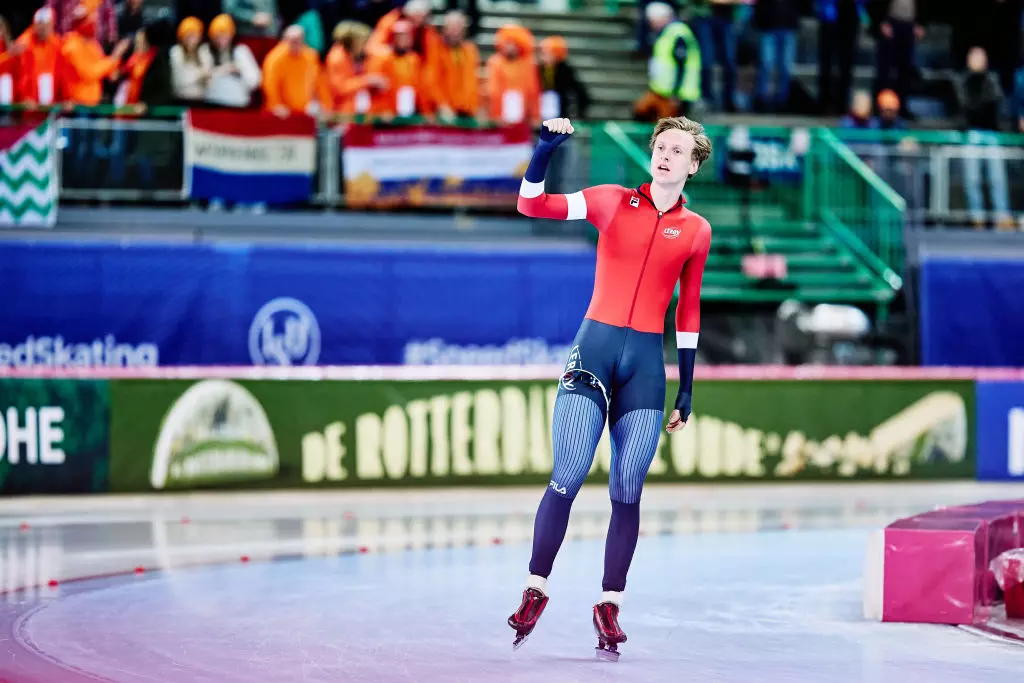
Sander Eitrem (NOR), spurred on by the home support, sprung a surprise by beating Patrick Roest's impressive time in the 5000m. @ISU
Cheered on by the home crowd, the Norwegian finished in 6:12.15 to win the distance and climbed to second in the ranking at 1.13s from Roest ahead of Sunday’s 1500m.
“I’m not surprised,” Roest said about Eitrem’s 5000m showing. “But I’m gutted to lose the 5000m. Of course, I’m still first in the ranking, but if there’s one distance I would want to win, it’s the 5000m.”
Eitrem was happy to be able to challenge the defending champion.
“It was a great race on the first day and it’s going to be an exciting Sunday," he said. "I did not expect the ranking to be so tight after the first day. We’ll wait and see [what happens] tomorrow.”
Format and schedule
The Sprint Championships are held on Friday and Saturday with a 500m and a 1000m for both genders on each day. The Allround Championships are scheduled on Saturday and Sunday. The men will skate the 500m and the 5000m on the first day, followed by the 1500m and the 10,000m on the second. The women face the 500m and the 3000m on Saturday, followed by the 1500m and 5000m on Sunday.
In both the Sprint and the Allround tournaments the final ranking is based on the so-called samalog score over four distances. The samalog system converts times into points, with the 500m as starting point. For a 500m race, the number of seconds counts as the number of points. For the 1000m the number of seconds is divided by two to calculate the number of points; for the 1500m it’s divided by three, for the 3000m by six, for the 5000m by ten and for the 10,000m by twenty.
For all information about the ISU European Speed Skating Championships, please visit the webpage here.
Where to watch
Viewers will be able to watch the ISU European Speed Skating Championships (local time) via their national broadcaster/channel.
For countries where there are no broadcasters, the ISU will offer a live stream on the Skating ISU YouTube Channel. You will find the full list on the Where to watch webpage here.



.png)

